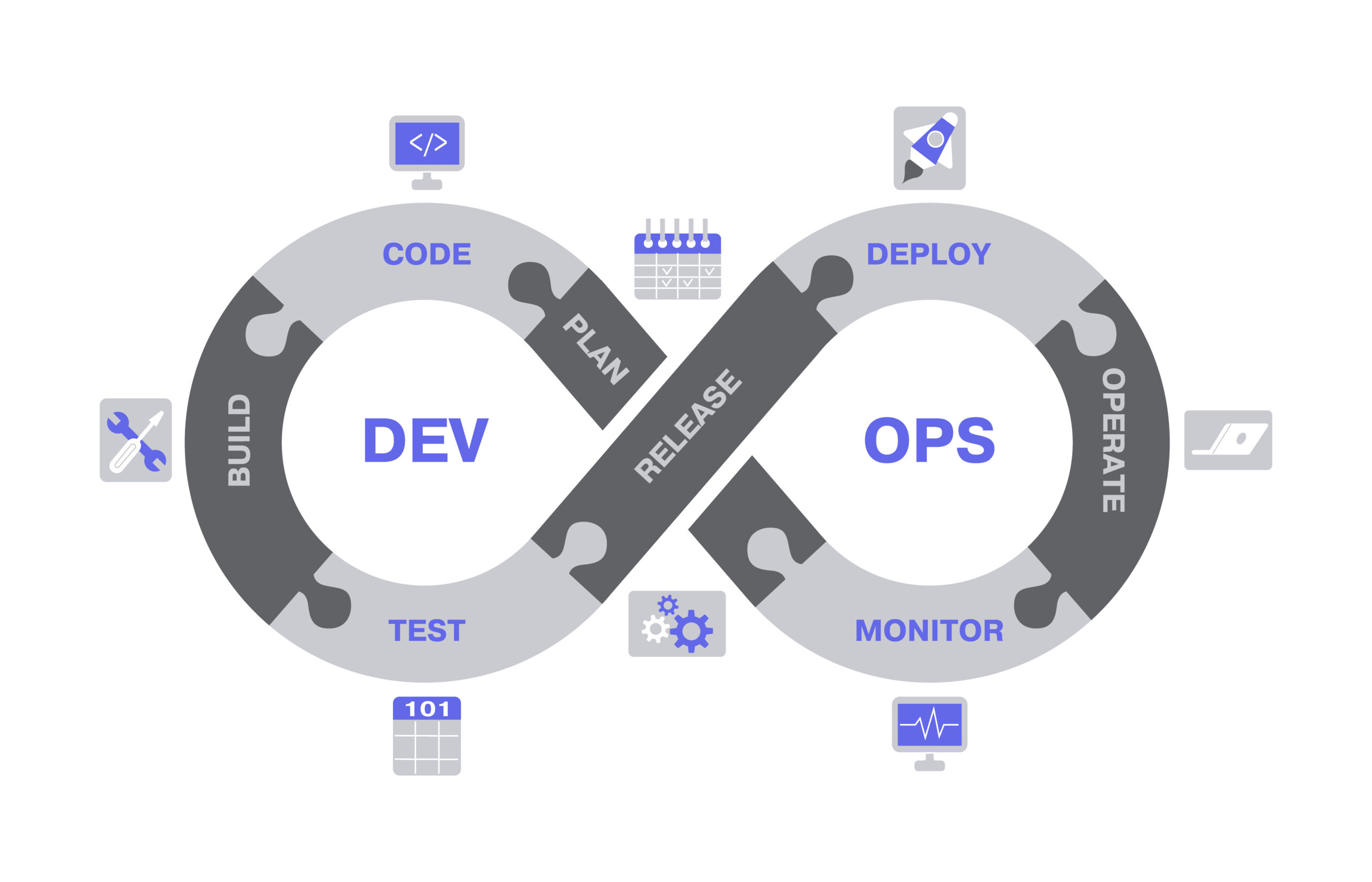Introduction to DevOps
DevOps is an organizational approach that focuses on improving collaboration between software development and IT operations teams. The goal is to shorten the systems development life cycle and enable continuous delivery of high-quality software (OpsLevel, 2022).
DevOps has grown in importance and popularity in recent years. According to OpsLevel (2022), the DevOps approach helps teams improve software quality through automated verification and faster release cycles. The State of DevOps Report (Puppet, 2022) found that high performing DevOps teams can deploy code up to 208 times more frequently than low performers.
Benefits of DevOps Certification
Obtaining a DevOps certification can provide numerous benefits for IT professionals looking to advance their careers. Here are some of the key advantages:
Faster product delivery – DevOps emphasizes collaboration between development and operations teams. This streamlined process enables faster development cycles and more frequent product releases. According to a study by American Technology, DevOps adoption can lead to 200x more frequent deployments.
Improved collaboration – DevOps breaks down silos between teams by promoting communication and collaboration. Developers and ops engineers work together closely, share responsibilities, and align goals. This collaboration results in increased efficiency and productivity.
Better career prospects – There is huge demand for DevOps skills in the job market. A DevOps certification helps professionals stand out and proves hands-on expertise. According to research by Simplilearn, 67% of managers prioritize hiring certified professionals. DevOps engineers also command high salaries, with an average pay of $140,000 per year.
DevOps Certification Process
There are a few different ways to prepare for DevOps certification exams, depending on your learning style and schedule. The main options are self-study, classroom training, and online training.
Self-study involves using books, video courses, practice tests, and other resources to learn the material at your own pace. This allows for flexibility but requires discipline and self-motivation. Popular self-study resources include the DevOps Institute and AWS exam guides.
Classroom training offers structure and guidance from an instructor. DevOps courses are available through technical schools, colleges, and private training centers. This interactive approach suits some learning styles but requires attending sessions at set times.
Online training delivers that same instructor-led experience through live or pre-recorded video lessons. This allows access from anywhere while maintaining a classroom feel. Leading online DevOps training providers include H2K Infosys, Udemy, LinkedIn Learning, and A Cloud Guru.
The right training method depends on your schedule, budget, and personal preferences. Many certification candidates use a combination of techniques, like taking a course to build foundational knowledge and supplementing with self-study materials for review.

DevOps Certification Training
A comprehensive DevOps certification training program typically lasts between 2-3 months and is offered in both online and offline formats. The training covers a wide range of in-demand DevOps skills including:
- Linux fundamentals
- Git and GitHub
- Docker containers
- Jenkins
- Ansible
- Kubernetes
- Terraform
- AWS/Azure DevOps
- Agile and Scrum methodologies
At the end of the course, students have to take a certification exam which tests their knowledge across these topics. Popular DevOps certifications include the AWS Certified DevOps Engineer, Certified Kubernetes Administrator (CKA), and Red Hat Certified Specialist in Ansible Automation.
The certification provides proof of expertise in DevOps processes and tools which is highly valued by employers.
H2K Infosys – DevOps Training
H2K Infosys offers comprehensive DevOps training and certification programs to help professionals launch and advance their careers. Their DevOps course is designed and delivered by industry experts with over 10+ years of experience.
The DevOps course covers over 30 hours of in-depth training on key topics like Configuration Management, Continuous Integration, Continuous Delivery, Continuous Testing, and more. Students gain hands-on experience through real-world projects and case studies.
Upon completion, H2K provides certification to validate your DevOps skills and knowledge. Their certifications are recognized by top companies and can give your resume a significant boost.
H2K also has an excellent track record for placement assistance. Many students have landed their dream DevOps jobs after completing the H2K training and certification. Here are a few success stories:
- – Priya completed H2K’s DevOps course and earned 3 certifications. She is now working as a DevOps Engineer at a leading tech firm.
- – Ramesh struggled to find work after graduation. After H2K’s DevOps program, he got recruited by a top MNC as a DevOps Consultant.
- – Leela was stuck in software testing roles for years. The H2K certification enabled her to transition into a DevOps role with a 40% salary hike.
- H2K’s real-world training, certifications and placement assistance can be a game-changer for your DevOps career aspirations.
Career Benefits of DevOps Certification
Obtaining a DevOps certification can lead to tremendous career benefits for IT professionals. Some of the key advantages include:
Higher Salaries – DevOps engineers are among the highest paid IT professionals today. According to Glassdoor, the average salary for a DevOps engineer in the US is $140,000. With a DevOps certification, you can expect a significant boost in your earnings potential.
More Job Opportunities – There is a huge demand for DevOps skills in the market currently. LinkedIn’s 2020 top skills report ranked DevOps as the #2 most in-demand hard skill. With a DevOps certification, you become a top candidate for lucrative DevOps roles.
Career Advancement – As companies embrace DevOps methodologies, they are looking to upskill existing employees. A DevOps certification allows you to gain the right skills to take on leadership roles and advance your career quickly.
In summary, DevOps certification can be a pathway to reach new heights in your IT career. The certified skills are highly valued and sought after, opening doors for higher compensation, exciting job opportunities, and rapid career growth.
Real-World Success Stories
It’s one thing to talk about the benefits of DevOps certification, but it’s even more powerful to hear directly from professionals whose careers have been transformed by it. Here are some real-world success stories of IT professionals who leveraged DevOps certifications to advance their careers:
Wande Adams had little tech experience beyond building websites as a hobby. After taking a DevOps course, he gained hands-on experience through project-based learning and mentorship. Adams shares: “The program really prepared me for a career in DevOps engineering. After completing the program, I secured a role as a DevOps engineer at a leading digital agency in London.”
Manjunad was working as a manual tester when he decided to skill up with DevOps training and certification. Shortly after obtaining multiple DevOps certifications, Manjunad landed a new role as a DevOps engineer with a 65% salary increase. He now leverages automation, CI/CD pipelines, and cloud technologies in his work. Manjunad notes his certifications were key in transitioning careers from testing to DevOps.
Paul Zhao was already an AWS Certified Solutions Architect Professional before pursuing DevOps certifications. By also obtaining the AWS Certified DevOps Engineer certification, Zhao expanded his skillset. This enabled him to advance to senior technical roles focused on CI/CD, infrastructure automation, and cloud architecture. Zhao highlights how the combination of certifications opened doors in his career.

Exam Tips and Preparation
Passing DevOps certification exams requires thorough preparation and study. Here are some tips and resources to help you succeed:
Focus your studying on the exam objectives and blueprint provided by the certification body. For AWS certifications, the exam guide outlines the domains tested and their weightings so you can prioritize topics. Sources like How to Pass AWS Certified DevOps Engineer — Professional analyze the exam in detail.
Use official practice exams to gauge your knowledge and identify gaps. Hands-on experience with the real test format is invaluable.
Read the documentation for all services covered in the exam. First-hand knowledge straight from the source is best. The AWS DevOps Certification Professional Exam guide recommends reviewing key services like CloudFormation, CodeDeploy, CodePipeline.
Learn from video courses and hands-on labs to cement your practical skills. Resources like H2K Infosys, Linux Academy, A Cloud Guru, and Qwiklabs offer robust AWS exam prep programs.
Join online study groups and forums to discuss tough topics and study strategies. Connecting with others prepping for the same exam is invaluable.
With diligent preparation using recommended study materials and practice exams, you can pass your DevOps certification exam confidently.
Additional Certifications
Beyond the core DevOps certifications, there are a number of related and complementary certifications that can further boost your skills and expertise:
AWS Certified Solutions Architect – Associate: This certification demonstrates your ability to design distributed applications and systems on AWS. It complements DevOps skills by building cloud architecture knowledge .
Certified Kubernetes Application Developer (CKAD): The CKAD certifies your ability to design, build, configure, and expose cloud native applications using Kubernetes. It expands on DevOps containerization skills.
HashiCorp Certified: Terraform Associate: This certifies skills for provisioning infrastructure safely and efficiently using Terraform. It augments infrastructure-as-code knowledge for DevOps .
Certified ScrumMaster (CSM): The CSM validates proficiency in Agile methodology and Scrum practices. It brings project management aspect to DevOps.
Conclusion
In summary, DevOps certifications provide immense value for IT professionals looking to advance their careers. The key benefits include:
- Improved job prospects and higher salaries
- Hands-on experience with DevOps tools and processes
- Ability to implement DevOps methodology in organizations
- Faster production and delivery of software applications
- Enhanced collaboration between development and operations
With the rising popularity of DevOps in the IT industry, obtaining a certification can give your career a significant boost. The training equips you with the required skillset to thrive in DevOps roles. Whether you are just starting out or looking to transition into DevOps, a certification serves as a validation of your expertise.
We hope this guide has shed light on the immense career benefits of pursuing a DevOps certification. With the right training and preparation, it can fast-track your career growth in exciting new directions. Go ahead and invest in yourself – the opportunities are endless!

